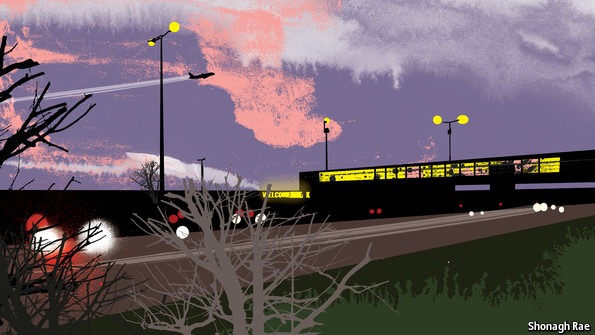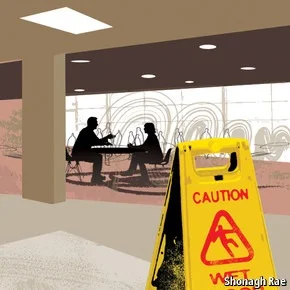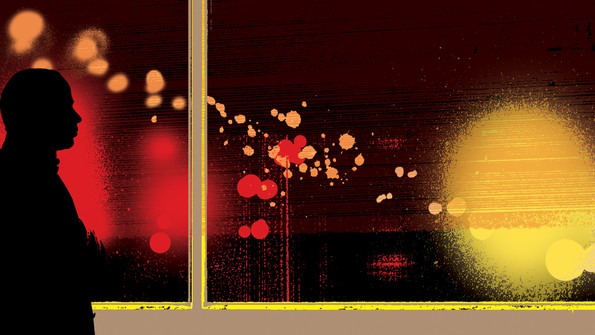
Midnight in Nowheresville: 24hrs in a motorway service station
On the road in middle England
The Economist | December 21st 2013 | Between junctions 25 and 26 on the M1

MIDNIGHT is for gamblers. They drive across from Nottingham and Derby to play the slot machines, replenished during the day by hurried amateurs. A one-armed bandit called Sizzling 500 churns out coins for a heavily tattooed, gold-toothed pro in a baseball cap and Bermuda shorts. “It’s all 10ps,” he grumbles.
The witching hours are for mysteries, too, some perhaps best left unsolved. Why has that burly, shaven-headed man wearing baseball kit sat alone beneath the glaring lights for several hours, leaving abruptly at one in the morning? What is that convocation of men around a jeep discussing in the car park? Why, at two o’clock, has a busload of beautiful Asian women, well-behaved children and gently patriarchal men in blue shalwar kameez, all oscillating between Urdu and English, appeared at the coffee counter like a technicolour hallucination? (They are going home to the Midlands from a wedding in Leeds, a father explains.)
For the skeleton staff of chefs, baristas and shop assistants, the night shift is for coulda-shoulda-woulda reveries: reminiscences about bad breaks, wrong turns and temporary exigencies that somehow became permanent. “I don’t know why I’m still doing this,” a young man confides; “I’ve got to get out.” And, for them, the night means fear. Out in one of the petrol stations, the lone attendant says that, not long ago, a customer enraged by the price of coffee threatened to beat him up. There is a panic button under the counter, but the police response time is six minutes: “a long wait when someone’s going to knock your teeth out.” He needs the double pay he gets, but says he can’t take many more nights. “You roll the dice every time,” says another nighthawk.
Trowell service station, slap in the middle of England on the M1 motorway, is not a place many people would associate with intrigue or passion. For most people motorway services are scarcely places at all, but blurred nowheres on the way to somewhere else. Spend 24 hours here, however, and this bland yet strange locale—a sort of amenity that almost everybody visits but hardly anybody notices—emerges as a microcosm of modern Britain’s complexion and pathologies. A day here reveals Trowell’s special rhythms and ecosystem, its microdramas and eccentricities, murmured sadnesses and hopes.
Nowhere and everywhere
One of the Soviet Union’s best-loved films was “Irony of Fate”. A man wakes up after a drinking binge, thinking he is in his apartment in Moscow. Actually he is in Leningrad—the architecture, street names and furniture are identical in both cities. Bittersweet hilarity ensues. The spread of high-street brands across the West has created a capitalist version of this soulless, befuddling homogeneity. With their Starbucks and McDonald’s, many shopping districts these days feel like standard-issue Anytowns. This trend appears to reach its apogee at Trowell.
In 1967, when Trowell opened and motorways were new enough to thrill, the pit-stop had a Robin Hood theme (Sherwood Forest, in which the outlaw stories are set, is nearby). The style was medieval pastiche: heraldic decorations, suits of armour, a mosaic of jousting knights and “The World Famous Sheriff’s Restaurant”. Today the main facility comprises two low-slung, bunker-like buildings, one on either side of the motorway, which are linked by a bridge across the traffic. On each side there is a Burger King, a Costa coffee shop and an EDC café, plus a WHSmith newsagent and some jangling fruit machines. The outlets face each other around the twin food courts like rival factions at a powwow, but in fact they are franchises all operated by the same company, Moto. Little besides the massage chairs on the southbound side distinguishes it from its sibling across the bridge.
Typically for modern Britain’s service sector, some of the staff on duty in the small hours are foreigners. At the hotel close to the main building, the Polish receptionist is working a fearsome double shift. Just before six, a Portuguese employee sets out the newspapers at Smith’s. Nobody likes the night shift, he says, but someone has to do it.
There is a squad of Portuguese workers at Trowell, he explains, friends from Porto who migrated in a chain. These days there is no work at home. A compatriot was a maths teacher in Portugal but here she is an attendant in the petrol station; the others are cleaners. “I miss my family,” one of them says as she drags out the pizza boxes that are blocking a rubbish bin. “I miss my country. Nice weather,” she adds, with a glance at the sputtering sky, an ironic attitude to the climate that suggests she is halfway to assimilating with the locals.
Assorted domestic tribes meet here, too. To begin with, rather like budget airlines, another catch-all service, Trowell is a pageant of class, with all the subtle gradations that, to the English eye, are immediately distinguishable by their shoes (moccasins to bovver boots) and haircuts (crew cuts to quiffs). And by their vehicles: the toffs’ cars tend to be the tattiest.
The early-bird customers include a gentleman in tell-tale posh-pink trousers, professionals in suits and civil servants with security tags dangling pre-emptively around their necks. Alongside them comes a steady stream of down-to-earth tradesmen: heating engineers, roofing experts, glaziers, refrigeration and insulation specialists. They arrive in pairs, often in company-branded polo shirts and paint-spattered trousers; the larger man in the duo generally seems to be in charge. Later in the morning a lavishly tattooed, many-earringed and exasperated coach driver is cleaning up an unidentified fluid from the floor of his vehicle. His passengers, an already-boozy group of rugby supporters, are on their way to London for a match.
Northern and southerners commingle with the classes—the M1 motorway is the main road link between England’s post-industrial north and the more prosperous south. The consensus among the regulars is that northerners are nicer.
“Any ladies in your life?” a woman selling American make-up calls to passing men. “We’re from California,” she claims, not altogether convincingly (later she admits to being from Nottingham). After a broad exposure to people travelling in both directions, her main inference is that Londoners are rushed and grumpy. A catering worker agrees. Northerners have time for a chat, she says; southerners do not.
Towards noon, a jovial rep from the AA, a motoring organisation, mans his membership stall outside an entrance, joking with the refugee smokers perched on a wall. He describes how, whether northern or southern, drivers’ faces tend to fall when they see him and his sales paraphernalia, and how some trace wide parabolas to avoid him. He doesn’t mind, he says; he is used to it. Britain has its driving enthusiasts, but its car culture is not like America’s: the highway is less a realm of freedom than of tailbacks, speed cameras and road-rage.
A country is the sum of its classes, regions and nationalities. But another way to think of Britain is as a collection of families, in their various shades of dysfunction, and as a shifting mix of feelings, from bliss to despair. During the lunchtime rush, those spectrums are also visible at Trowell.
Unhappy in their own ways
In the queues at Burger King and squabbling at the tables are marsupial babies; young girls in pink dresses and boys in replica football tops; adolescents trying to distance themselves from their parents while fiddling with their phones; fractious grown-ups (“Just leave it in the car, Andy!”); grandparents valiantly making themselves useful.
Young couples hold hands and bicker flirtatiously; older ones sit in not obviously companionable silence. A family of Orthodox Jews are making their way from London to the yeshiva (seminary) town of Gateshead for the Sabbath. With the special British genius for picnicking in insalubrious spots, some carry their snacks to a patch of grass a few metres from the roaring motorway.
The lunches themselves are symptomatic of Britain’s half-evolved attitude to food. By the late 1970s the cuisine in service stations was infamous enough to help prompt a government inquiry into them; its report judged that the chips in many were “poorly cooked and soggy”, the peas “excessively hard or soft”, while prawn cocktails comprised “small bland prawns” in a “thin, tasteless sauce”. The nuanced coffee menus at Trowell suggest a rise in sophistication, but the cooking itself might not have advanced all that much. A lock-fitter on his way from Sutton Coldfield to Newcastle complains that the fish and chips are cold and overpriced; the chips are cardboard and the peas boiled to oblivion. “Any ladies in your life?” says the tireless make-up saleswoman.

Keep your eyes open and you notice heartfelt anguish as well as the culinary kind. One kitchen hand tells of a couple who regularly arrive in different cars, hold hands over a plastic table for an hour, then go their separate, star-crossed ways. Another has talked down a would-be suicide, whose wife was having an affair with his best friend, over a cup of tea. At 3.45 in the afternoon a young man with a bag of rolling tobacco in his hand, his worldly goods stuffed into rucksacks, and an air of woe asks for a lift south. He isn’t put off by Londoners. They can’t be any worse than the people he has escaped from in Sheffield, he says.
Not long afterwards a father makes a rendezvous with his wife’s new partner, to pick up his son for the weekend. Father and son plod wordlessly back to the car park together, several metres apart. A party of elderly Caribbean men, in dark suits and Trilbys, stop on their way back from a funeral.
There are minor salvations as well as gloom. As the lorries begin rolling in for the night, the forlorn hitchhiker finds a lift.
God and mammaries
Service stations have their own psychogeography. The toilets are their epicentre; people gravitate towards them at pace, often with a desperate child or two in tow. The gents’ are ornamented with condom machines and adverts for erectile-dysfunction treatment, arguably an insensitive combination. Outside, the motorway hotel squats like a penitentiary (in the early evening, the Polish receptionist is in negotiations with a large, half-naked man who is demanding an extra duvet). In a corner of one of the car parks is a discreet lane, for use by authorised vehicles only, which connects the services to nearby towns. This, people speculate, is the way the tramps who spend their nights here arrive; one of them slept on the deck outside a coffee shop for much of the summer. Walking up the lane feels rather like Truman’s flight from his artificial life in “The Truman Show”. The road rises into the countryside, flanked by hedgerows, wild flowers, pheasants sheltering in a corn field. Farther up there is a ghoulish, burned-out car.
The psychological bad-land, for most of Trowell’s visitors, is the outer parking area where the lorries draw up. Lorry drivers have a reputation for roughness, on and off the road. But Trevor, a veteran from Lowestoft, is amiably chatty as he settles in for the evening. He bemoans the advantage that cheaper fuel gives foreigners, but, with the usual duality of British attitudes to the continent, longs for the civilised rest stops in Belgium. He dreams of retiring to France.

Trevor dislikes the parking charges at Trowell, but, he says, at least here you don’t wake to discover that your fuel has been siphoned off, as can happen if you park up for the night on the roadside. There is some low-level banditry at service stations, he warns, especially theft from slashable, fabric-flanked “curtain-siders”: when you see one with the back doors open, the driver has left them that way to show crooks that the lorry is empty. Prostitutes sometimes knock on the drivers’ doors after dark.
As well as its bad-land Trowell has a spiritual zone, tucked away in an elevated corner at the top of the steps that lead to the bridge. Towards nine o’clock, inside the small, carpeted, faith room, a man kneels in prayer. An arrow on the ceiling points towards Mecca. A stack of Korans and a low sink for foot-washing complete the decor.
Peruse the comments book when the prayer room is empty, and you find Muslims from Dewsbury and Sheffield calling on Allah to reward those who set up this facility. One person has written: “May Allah grant Jannat [Paradise] to all those who made this place, and to the foreign chap who showed me up here.” Not everyone is quite so friendly. “Keep believing in the invisible sky fairies,” a man called Pete has scrawled. “Kind regards from all us Muslims,” someone has responded. “Thanks,” says Jerry from Bradford, “much cheaper than a hotel.”
To judge from the orisons overheard on this 24-hour stretch, Trowell has two religions: Islam and celebrity. The staff tending the deep-fat fryers and counters are as eager as any London cabbie to tell you about the football and snooker players and soap-opera stars who have nipped in for a coffee or a pee. A chef once spotted Patrick Stewart from “Star Trek”. The make-up saleswoman has met a superannuated pop star and an Olympic swimmer. An attendant on the late-evening shift in the petrol station has scored the unbeatable double of Katie Price, a pneumatic glamour model, and Frank Bruno, a heavyweight boxing champion turned pantomime actor.
Like the fast-food brands and the boxy architecture, this devotion to confected celebrity is another reason to feel that you might as well be anywhere. But, for those who care to find them, Trowell has its quirks. Up the staircase, on a wall near the prayer room, there is a funny mural, an oddball tribute to the services’ faux-medieval past. The picture depicts Robin Hood and Maid Marian at a picnic. Bad King John leans across a castle’s battlements; a Burger King standard flutters above him.
Alone together
Pay attention and you find that a place that seems to epitomise the anomie and perpetual motion of 21st-century life actually harbours a community. “The staff of a service area”, sympathised that 1970s report, “are often working under great pressure in remote and isolated places…They receive more kicks than thanks and this, in a curious way, unites them in a common struggle against adversity.” That sense of embattled affinity lives on.
There are the Samaritans who fed and watered the tramp who slept on the deck; there is the clan of Portuguese. There is a post lady who pops in for a gossip with the kitchen team on the way to her round. There are the coach drivers on the overnight London to Scotland routes, who are replaced here for the second half of the journey and drop in for a cuppa and a chat. Perhaps because most people are in such a rush to leave, jiggling their car keys as a signal of intent, it doesn’t take long to find a niche in this community, which comes with only the politest hint that spending a full day here might be a little peculiar.
In a way, that haste to get back to the motorway, with its gnarled verges and phantom traffic jams, is odd. Most people spend much of their time on the way somewhere; in the end these moments in Trowell may be no lonelier or less meaningful than many others. And most of life can be found here: love, grief, happy and imploding families, regrets, dreams and unloved jobs that are nevertheless clung to like the debris of a shipwreck.
Just before midnight, head up to that bridge across the motorway and between those two identikit little worlds. Ignore the Muzak and the permanent plastic cones advising “Caution—Wet Floor”. Screen out the erratic strip lighting and peer through the window. The red lights recede on one side of the road while the yellow ones shine towards you on the other, the reflections of both dancing in the dark glass in front of you. Perched on the bridge, life racing below, you feel, momentarily, that you are standing at the pivot of the world.